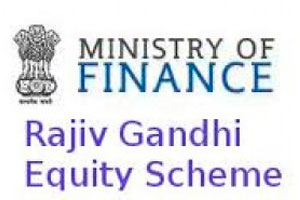Rajiv Gandhi Equity Savings Scheme (RGESS) – this new tax saving scheme was introduced in 2012 Budget to attract retail investors to invest in Equity, directly or indirectly. RGESS scheme was introduced in 2012 budget, but the details of this scheme were made available only in Sep 2012.
Presently, only 3-4% of Indian household savings is going into equities as compared to 42% in the US and 14% in China
How much is the Tax Benefit?
Under section 80CCG of the IT act 1961, an investor will get a tax deduction of 50% on the Investments made under RGESS. However, the maximum investment amount eligible for deduction is Rs 50, 000 or maximum tax exemption of Rs 25000.
This tax exemption is over & above limit of Rs 1 lakh under section 80C. See my other post on – Tax saving options under section 80C.
In Budget 2013-14, the tax benefit under RGESS is extended to three successive years.
Who are eligible to get this tax benefit?
As the intention of this scheme is to attract “new retail investors” towards equity market, the exemption is only available to “new investors” in Equity market.
A ‘New Retail Investor’ is:
• A Resident Individual whose Gross Total Income for the Financial Year in which investments are made is less than or equal to Rs.10 lakhs. UPDATE – Budget 2013-2014 – The limit for investors wanting to invest in RGESS has been raised to Rs 12 Lakhs instead of Rs 10 lakhs.
• Someone who has not opened a Demat account and not made any transactions in the derivative segment before November 23, 2012.
• Someone who has opened a Demat account before November 23, 2012 but has not made any transactions in the equity segment or the derivative segment till November 23, 2012.
• Is not the first account holder of an existing joint Demat account.
Where can I invest to get the exemption under RGESS?
To avail the exemption under RGESS scheme, investment should be made only in “eligible securities”.
Eligible securities under RGESS are:
• Equity shares of the companies forming part of the ‘CNX-100’ or ‘BSE-100’ Index.
• Equity shares of Public sector enterprises categorized as Maharatna, Navratna or Miniratna by the Central Government.
• Units of Mutual Fund schemes Exchange Traded Fund which invests in the said eligible securities provided they are listed and traded on a stock exchange and settled through a depository mechanism.
• IPOs /NFOs of above mentioned companies/Schemes.
• IPOs of PSU.
Is there any lock in period in RGESS like ELSS schemes?
Yes, there is a lock in period of 3 years for investments made under RGESS. Of this, the first year is the Fixed lock-in period and the subsequent two years will be Flexible lock-in period.
In the fixed lock in period you are not allowed to sell the securities.
In the flexible lock in, you are allowed to sell and reinvest the proceeds in the securities eligible under the scheme.
What is the process of investment under RGESS?
First of all, you need to open a DMAT account under RGESS. There may be 2 possibilities:
You do not have any existing DMAT account: In such case, you just need to approach any depository participant (DP) and ask them to open a RGESS DMAT Account for you. Most probably your existing bank will have a DMAT desk and will be able to help you with us. Otherwise, you can do directly to your nearest share broker or companies like ICICIDirect, Kotak Securities, Religare Securities, Reliance Money, HDFC securities, Axis Direct etc
If you already have a demat account but have not done any transactions in equity/derivative segment: In such case, you need to designate that demat account under RGESS. Approach your DP and ask them to designate your DMAT account under RGESS. Carry you ID & Address proof.
You will also need to submit a declaration under “Form A”. Download Form A
Can I buy other securities under this DMAT Account
Yes. You can buy other securities like shares, bonds, mutual funds, etc under the same DMAT account, but these investments will not give you any benefit under RGESS scheme.
However, you need to submit Form B in case you buy eligible securities and don’t want them to be included within the RGESS investment limit. Download Form B.
What will happen to my DMAT account after lock in period of 3 years?
Your RGESS designated demat account will be converted into an ordinary demat account at the end of the flexible lock-in period.
RGESS Investment Options – Direct in Shares or Mutual Funds – Which one to opt
As RGESS provide options to invest directly in shares of eligible companies or invest through notified mutual fund route, there will be dilemma in the minds of investors regarding which option to choose.
Direct Investment in shares: As you a first time investor, there is a risk that you may choose a wrong stock. Also you can’t sell shares before 1 year fixed lock in period. However, with this option you will have advantage of lower brokerage cost (around 0.5-.75%)
Via Mutual Funds Route: the charges under mutual fund route (known as expense ratio) can go upto 3% of investment corpus. But then you get benefit of normal mutual fund benefits of Professional Expertise and also they can buy/sell shares within one year also and invest in shares as per market conditions.
Suggestion: Since you will be first time investors with limited market knowledge, it will be better to invest through mutual funds.

